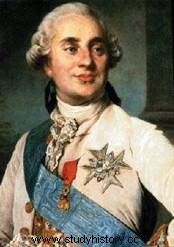 Louis XVI was king of France from 1774 to 1789 then king of the French until 1792:guillotined during the French Revolution, he was the last sovereign of the Ancien Régime. Grandson of Louis XV, the future Louis XVI is married to Marie-Antoinette, the daughter of the German Emperor François I. Aged only twenty, he ascended the throne of France in 1774. Surrounded by competent politicians, the young king nevertheless struggled, from the start of his reign, to impose the reforms necessary to restore the country's finances, while the people take a dim view of the expenses and extravagances of his wife. Unable to set the kingdom on the path to true economic, social and political modernization, Louis XVI precipitated the outbreak of the French Revolution, during which he was deposed, sentenced to death and then executed to prevent a return of the monarchy.
Louis XVI was king of France from 1774 to 1789 then king of the French until 1792:guillotined during the French Revolution, he was the last sovereign of the Ancien Régime. Grandson of Louis XV, the future Louis XVI is married to Marie-Antoinette, the daughter of the German Emperor François I. Aged only twenty, he ascended the throne of France in 1774. Surrounded by competent politicians, the young king nevertheless struggled, from the start of his reign, to impose the reforms necessary to restore the country's finances, while the people take a dim view of the expenses and extravagances of his wife. Unable to set the kingdom on the path to true economic, social and political modernization, Louis XVI precipitated the outbreak of the French Revolution, during which he was deposed, sentenced to death and then executed to prevent a return of the monarchy.
The birth of the future Louis XVI
In 1754, Louis Ferdinand, 24, dauphin and son of Louis XV, was expecting his fourth child. However, the year had started badly:on February 22, the six-month-old Duke of Aquitaine died of whooping cough. A new son was born on August 23, 1754. The child was immediately brought to the Church of Notre-Dame de Versailles and brought back to his mother. The king quickly returned from Choisy, discovered a baby "larger and taller than any of Madame la Dauphine's children", contemplated him, named him Louis Auguste and gave him the title of Duke of Berry, third in the order of succession to the throne.

From that moment, the newborn is entrusted to Madame de Marsan, governess of the children of France. The announcement is made to the sovereigns of Europe as well as to the Pope, a Te Deum is sung in the chapel of the castle which welcomes Louis XV and Marie Leszczynska. After the bells have rung all over Paris, the king lights with his own hand, a fireworks display using a common rocket.
His health was very fragile during the first months, so much so that we changed nurses. Weaned at eighteen months, the doctor recommends a clean air cure in Meudon and a treatment against smallpox. So as not to be alone, his eldest brother was authorized to accompany him between May and September 1756. Madame de Marsan, responsible for teaching them reading, writing and sacred history, did not offer him her affection:she prefers the younger Count of Provence and pays all his attention to the heir, the Duke of Burgundy. The little Duke of Berry feels very alone and neglected. His mother deals with the teaching of religious history, his father supervises the games and teaches them languages and morals. But here too, the parents take more interest in the eldest, considered more intelligent and pious.
The early youth of the Duke of Berry
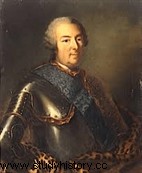 At the age of seven, the children come under the responsibility of the Duke of La Vauguyon, assisted by four assistants. The Duke of Burgundy therefore left his brothers in 1758 to be prepared to reign and the little Duke of Berry, who was only four years old, was left out and suffered greatly from this separation.
At the age of seven, the children come under the responsibility of the Duke of La Vauguyon, assisted by four assistants. The Duke of Burgundy therefore left his brothers in 1758 to be prepared to reign and the little Duke of Berry, who was only four years old, was left out and suffered greatly from this separation.
In the spring of 1760, following a fall from his horse by the eldest and although he had not reached the age of 7, Louis Auguste was authorized to leave women, to join his bedridden brother and to follow the same studies provided by the team of Monsieur de La Vauguyon. In November, the state of health deteriorates rapidly, the Duke of Burgundy is suffering from pulmonary and bone tuberculosis. Quickly, he was baptized, received extreme unction on March 16, 1761 and died on the night of March 20.
The young Duke of Berry fortunately did not see his older brother disappear; he is bedridden because of a high fever, certainly due to the anguish and despair of seeing his older brother very ill. He is traumatized when he learns of her death. Worse still when it is installed in the apartments of the deceased Duke of Burgundy! He cannot count on the love of his parents who find him taciturn and sullen and who turn to the Count of Provence. To close it all, a “grouped” baptism of the Dukes of Berry and Count of Artois took place in October 1761.
In August 1765, the Dauphin Louis Ferdinand contracted a violent fever and died in December; before his mother also died in March 1767 as a result of tuberculosis, Louis Auguste urgently had his confirmation and his first communion in December 1766. In less than six years, Louis Auguste, who was not yet twelve years old, lost his big brother, his father and his mother.
A studious and gifted student
The Duke of La Vauguyon recruits an additional assistant to teach morality and public law. Father Berthier pushes Louis Auguste to think for himself by advocating the method of free examination. He asks him to write eighteen moral and political maxims inspired by the work of Fénelon "the adventures of Télémaque". The young boy insists on free trade, the reward of citizens, the moral example that the king must be able to show. La Vauguyon was delighted, so much so that he let the young duke print this work, provided him with a press and the means to produce twenty-five copies. The young man is so happy that he offers one to his grandfather, but does not receive the congratulations he was expecting... The king is content to say "Monsieur le dauphin, your work is finished, break the plank". It should be noted, however, that the maxims were mainly about morality and virtue.
Despite this cold reception, Louis Auguste launches into a second work "Reflections on my interviews with Monsieur le Duc de La Vauguyon" and expresses his liberal vision of the monarchy when he writes that "kings are responsible for all the injustices they have been unable to prevent".
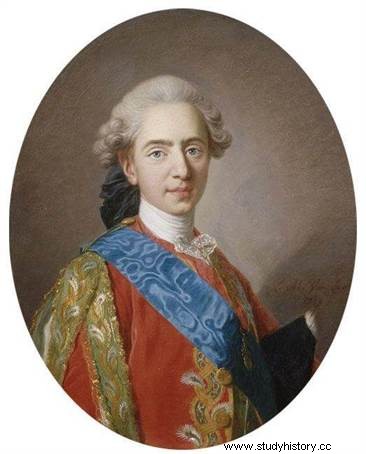 Considered to be insignificant, dreamy, clumsy, manipulable, the dolphin is a gifted, conscientious student, passionate about geography , mathematics, physics, rhetoric, astronomy. He excels in writing, grammar, logic, public law, history, dance and fencing. He learns Latin, German, Italian and is fluent in English. A little later, he began riding lessons and developed a passion for the mechanical arts such as watchmaking and locksmithing. Although gifted in all of these areas, he is shy and lacking in character, though he is comfortable welcoming historians and philosophers to court, sometimes showing humor. His grandfather is approaching 60 years old and finally shows some interest in the dolphin, even if he has no disposition in politics and war, not having enough knowledge in these areas.
Considered to be insignificant, dreamy, clumsy, manipulable, the dolphin is a gifted, conscientious student, passionate about geography , mathematics, physics, rhetoric, astronomy. He excels in writing, grammar, logic, public law, history, dance and fencing. He learns Latin, German, Italian and is fluent in English. A little later, he began riding lessons and developed a passion for the mechanical arts such as watchmaking and locksmithing. Although gifted in all of these areas, he is shy and lacking in character, though he is comfortable welcoming historians and philosophers to court, sometimes showing humor. His grandfather is approaching 60 years old and finally shows some interest in the dolphin, even if he has no disposition in politics and war, not having enough knowledge in these areas.
The end of learning
Around 1770, the king noted that Louis Auguste could succeed him without a regency and then thought of marrying him. Father Soldini, the priest at the king's bedside during Damien's attack and who is in charge of the Dauphin's religious instruction, insists on the "bad readings" to be avoided and advises him to remain good, frank, punctual. , open and faithful to his future wife. This abbot will also become his confessor when he becomes Louis XVI.
The dolphin is almost sixteen years old now, he has grown tall and has strong muscles. He remains shy, displaying a dark look and not daring to look at his vis-à-vis. Alone, he has no favourites; he speaks "high up", unpleasantly impressing his interlocutors. Despite his faults, the Court considers him perfectly capable of leading his life as a prince, with no other rules of conduct than the one he leads. Docile in the face of his instructors, in four years, he will be able to ascend the throne, driven by the desire to put into practice the precepts instilled by his masters.
When Louis XV died on May 10, 1774, the Dauphin, his grandson, was a 19-year-old young man, Louis-Auguste, Dauphin in title since the death of his older brother in 1761. If the death of Louis XV aroused a profound relief in the population, the accession of the young king gave birth to great hopes. Reputed to be good and generous, the new king was also of irreproachable morality which guaranteed that we would no longer see reigning at the Court of ruinous favorites as at the end of the previous reign. But the young Louis XVI would have to carry out several major projects in his kingdom and soon face an economic and financial crisis that would upset the whole of French society.The first steps of the reign of Louis XVI
When he ascended the throne, Louis XVI inherited a crisis already decades old:the parliamentary crisis. Since the beginning of the 18th century, the parliaments, these courts of the Ancien Régime, considered themselves to be the defenders of the populations of the provinces against the abuses of monarchical power. In reality, the social position of parliamentarians and the method of acquiring their offices, which are venal and hereditary, mean that they have no common interest with the majority of the French population. Nevertheless, they used their right of remonstrance on royal edicts as a weapon of contestation, and repeatedly refused to register the king's legislative acts. To break this opposition, the king can proceed with a bed of justice or, in the most extreme cases, exile the parliament out of his city. Louis XV had resorted to this measure several times and, at the accession of Louis XVI, the parliament of Paris was exiled since opposing the reforms of Chancellor Maupeou in 1771. One of the first political acts of Louis XVI is to recall parliament in the fall of 1774.
In fact, Louis XVI contributed to reconstituting a conservative force that had always clung to its privileges and had constantly refused the necessary reforms proposed by the sovereign. Louis XVI is a king deeply imbued with the importance of respecting the fundamental laws of the kingdom of France and he therefore does not wish to go against this traditional institution.
 For now, Louis XVI appoints Minister of Finance the man who wrote the economic articles of the Encyclopedia, Turgot. This minister will immediately launch a series of extremely daring reforms such as the freedom of the grain trade or the abolition of the royal corvée, masteries and jurandes. Turgot, however, did not have time to carry out all his reforms because he was forced to resign in 1776. His ambitious project of "uniform territorial subsidy", that is to say a tax paid by all, including the clergy and the nobility, had aroused the liveliest opposition of the privileged by the voice of the parliaments.
For now, Louis XVI appoints Minister of Finance the man who wrote the economic articles of the Encyclopedia, Turgot. This minister will immediately launch a series of extremely daring reforms such as the freedom of the grain trade or the abolition of the royal corvée, masteries and jurandes. Turgot, however, did not have time to carry out all his reforms because he was forced to resign in 1776. His ambitious project of "uniform territorial subsidy", that is to say a tax paid by all, including the clergy and the nobility, had aroused the liveliest opposition of the privileged by the voice of the parliaments.
Louis XVI and the economic and financial crisis
In two years, Turgot had built a tax collection system allowing France to have healthy finances and not have to resort to borrowing. But this unit will be totally ruined by the participation of France in the war of independence of the United States from 1776. The diplomatic negotiations of Benjamin Franklin, sent by the Insurgents in Paris, had finally involved France in the war against Great Britain. The French Minister of Foreign Affairs, Vergennes, hoped in this way to atone for the affront made to France in 1763 at the end of the Seven Years' War. If the war was a military success for the Franco-Americans, it considerably increased the financial deficit of the kingdom.
The man appointed to the post of finance minister to try to make up for this deficit was the Geneva banker Necker. He agreed to take out a loan but was well aware that it would be useless without a profound fiscal reform of the kingdom. The new experiments he tried to conduct triggered the hostility of the parliaments. Unable to overcome these oppositions, he published a Report to the King in which he revealed to the public the state of the finances of the State. In reality, this balance sheet was false because it had omitted military expenditure, the real causes of the deficit. By revealing how much the privileged orders really cost the country, Necker attracted the sympathy of the general public, but concentrated on him the hostility of the nobility who obtained his dismissal in 1781.
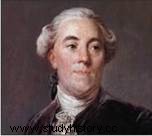 It took until 1783 for a finance minister to tackle the deficit problem again. In the meantime, this had become the main concern of the state. This new minister, Calonne, again had to resort to borrowing and launched a veritable communication campaign to restore confidence in the good financial health of France. But, without attacking the heart of the tax system, such expedients could not have lasting effects. The deficit continued to widen and Calonne had to resolve to present the king with a much more drastic savings plan.
It took until 1783 for a finance minister to tackle the deficit problem again. In the meantime, this had become the main concern of the state. This new minister, Calonne, again had to resort to borrowing and launched a veritable communication campaign to restore confidence in the good financial health of France. But, without attacking the heart of the tax system, such expedients could not have lasting effects. The deficit continued to widen and Calonne had to resolve to present the king with a much more drastic savings plan.
In the meantime, the country's economic situation had deteriorated considerably. The free trade agreement concluded with Great Britain in 1786 was then in question:by allowing the massive influx into France of industrial goods at low prices, it had led to the unemployment of thousands of workers in the French manufacturing cities. . This miserable population, increasingly numerous, greatly worried the royal authorities who feared a conflagration at the slightest spark.
The Queen and discredit cast upon the Court
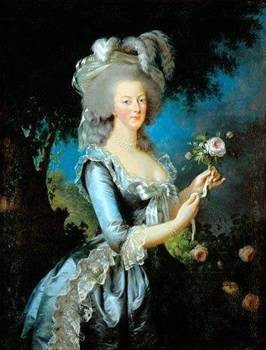 To understand the errors of the policy of Louis XVI in the first years of his reign, it is necessary to perceive the role of the Court and mainly of the Queen with the King. The king's lack of will and firmness, his irresolution and his weakness in the face of the courtiers and his wife have often been criticized. In fact, Louis XVI was raised within the devout party of the Court of Versailles, which hardly prepared him to easily accept the modernization projects proposed to him by his ministers. Moreover, he yielded to the recriminations of the privileged who demanded the departure of Turgot in 1776. This explains why most of the major reforms of the reign could never succeed or only resulted in half measures:the ministers always lacked the support of the king in the face of opposition from nobles or parliaments.
To understand the errors of the policy of Louis XVI in the first years of his reign, it is necessary to perceive the role of the Court and mainly of the Queen with the King. The king's lack of will and firmness, his irresolution and his weakness in the face of the courtiers and his wife have often been criticized. In fact, Louis XVI was raised within the devout party of the Court of Versailles, which hardly prepared him to easily accept the modernization projects proposed to him by his ministers. Moreover, he yielded to the recriminations of the privileged who demanded the departure of Turgot in 1776. This explains why most of the major reforms of the reign could never succeed or only resulted in half measures:the ministers always lacked the support of the king in the face of opposition from nobles or parliaments.
The personality of the Queen, Marie Antoinette of Austria, also had an important role in this period. Married to the Dauphin in 1770, she is the guarantor of the alliance between France and Austria. Faced with this stranger there always remained a deaf mistrust which encouraged the spread of many rumors about her. People also laughed at Louis XVI's reluctance to see her, and consequently attributed to her a multitude of lovers as well as a relationship with the Comtesse de Polignac. In reality, his spontaneity and his disdain for the rigid etiquette of Versailles provoked the reprobation of a population very attached to respect for the values and protocols of the monarchy.
A very severe blow was dealt to the prestige of the Court in general and of the Queen in particular by the affair of the necklace in 1785. This vast swindle mounted at the expense of the Cardinal de Rohan confirmed to public opinion Marie-Antoinette's reputation for levity in morals and only reinforced hostility towards her, although she had, objectively, no part in the affair.
Breaking the impasse:the Estates General
As the year 1787 begins, Calonne no longer has any means of coping with the deficit. New borrowings are only used to pay interest on previous borrowings. We then evoke the possibility of convening the States General, an ancient monarchical institution whose function is theoretically to consent to new taxes levied by the king. To avoid this recourse, Calonne created an assembly of notables who would fulfill this role. Placing all the hopes of improving the financial situation of the country in an assembly, even composed of privileged people, is already a revolution.
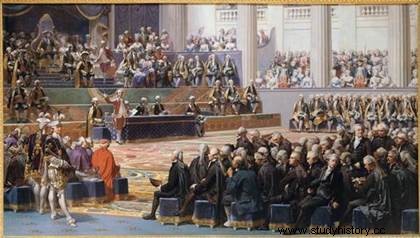 The critical state of the royal treasury, to which are added the noble opposition to absolutism, the malaise social and economic, decides Louis XVI to recall Necker and to convene the Estates General (May 1789). Despite his agreement for the doubling of the representation of a third party in the Estates General, acquired in December 1788, the king's silence on the question of voting by order (recommended by the Parliament of Paris) or by head, during the opening session of the States General, May 1, 1789 in Versailles, causes immense disillusion in the ranks of the bourgeoisie. The king does not intend, in fact, by this decision to ruin the foundation of the social edifice on which his kingdom is built.
The critical state of the royal treasury, to which are added the noble opposition to absolutism, the malaise social and economic, decides Louis XVI to recall Necker and to convene the Estates General (May 1789). Despite his agreement for the doubling of the representation of a third party in the Estates General, acquired in December 1788, the king's silence on the question of voting by order (recommended by the Parliament of Paris) or by head, during the opening session of the States General, May 1, 1789 in Versailles, causes immense disillusion in the ranks of the bourgeoisie. The king does not intend, in fact, by this decision to ruin the foundation of the social edifice on which his kingdom is built.
The members of the third estate, finally reunited, refuse to leave if the monarch does not accept reforms. Constituted in National Assembly, they are joined by deputies of the clergy and the nobility. On June 20, by the oath of the Tennis court, they undertake to give France a Constitution. Louis XVI, restive, can no longer pretend to ignore them. Absolute monarchy will gradually give way to constitutional monarchy.
Louis XVI in the tumult of the French Revolution
For fear of an aristocratic plot, the people of Paris rose up:the storming of the Bastille on July 14, 1789. Louis XVI returned to Paris on the 17th, while the first aristocrats go into exile. The National Assembly votes the abolition of privileges on the night of August 4 and proclaims the Declaration of the Rights of Man and of the Citizen. Louis XVI being reluctant to take note of these changes, the Parisian population went to pick him up at Versailles on October 6, 1789 and brought him back to the Tuileries. The constituents continued their work and, on the feast of the Federation, July 14, 1790, the king and the people came together in a seemingly good agreement. Always hostile to reforms that go against his convictions as a monarch, the king tried to leave Paris on June 20, 1791 but was arrested in Varennes, then brought back to Paris. The Constitution was promulgated on September 14, 1791. Executive power returned to the now King of the French.
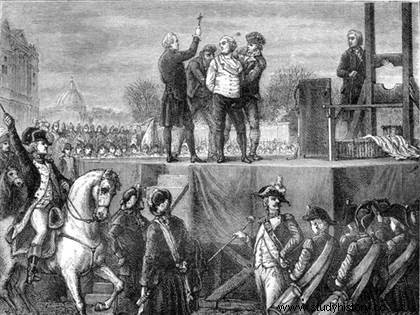 The flight from Varennes nevertheless marked the final break between the people and the king. The hesitant and contradictory attitude of the monarch from the start of the Revolution, the influence of his wife and his brothers (the Count of Provence and the Count of Artois), the secret support given to emigrants, the suspensive vetoes under the Legislative Assembly, intended to put a brake on the Revolution, and the secret negotiations with the enemy after the declaration of war against Austria (April 1792) had already taken a toll on the royal prestige. Brunswick's manifesto threatening to raze Paris if the royal family is not respected provoked popular indignation and the insurrection of August 10, 1792. The Tuileries were stormed and the king and his family had to take refuge in the national assembly.
The flight from Varennes nevertheless marked the final break between the people and the king. The hesitant and contradictory attitude of the monarch from the start of the Revolution, the influence of his wife and his brothers (the Count of Provence and the Count of Artois), the secret support given to emigrants, the suspensive vetoes under the Legislative Assembly, intended to put a brake on the Revolution, and the secret negotiations with the enemy after the declaration of war against Austria (April 1792) had already taken a toll on the royal prestige. Brunswick's manifesto threatening to raze Paris if the royal family is not respected provoked popular indignation and the insurrection of August 10, 1792. The Tuileries were stormed and the king and his family had to take refuge in the national assembly.
Prisoner of the insurrectionary Commune, the king is suspended from his duties and locked up in the prison of the Temple. The trial of Louis XVI opened on December 11, 1792 in a stormy atmosphere. "Louis Capet" is tried and found guilty of "conspiracy against the freedom of the Nation". His three defenders fail to save him. Sentenced to death without appeal to the people or reprieve, despite the moderate attitude of the Girondins, he was executed on January 21, 1793 at 10 am, on the Place de la Révolution (Place de la Concorde). He declares before his death:“I forgive the authors of my death. I pray to God that the blood you are about to shed does not fall on France. »
Bibiography
- Louis XVI by Jean-Christian Petitfils. Perrin, 2005.
- The Kings who made France:Louis XVI by Georges Bordonove. Pymalion, 1983.
- The schemer:New revelations about Louis XVI, by Aurore Chéry. Flammarion, 2020.
